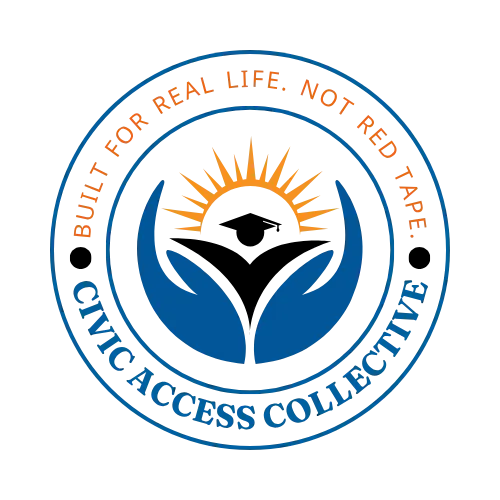Support Civic Access Collective
Help us build service, skill-building, and participation pathways that actually count.
Civic Access Collective is a new nonprofit initiative supporting people impacted by Medicaid and SNAP work requirements. We’re creating accessible, verified programs—so people can meet these requirements through real service and skill-building, not red tape.

Your donation directly supports:
Free digital job readiness training
Community service opportunities that qualify
Tracking systems participants can use to meet state requirements
Outreach, tech, and legal infrastructure for our launch
We’re just getting started—and your early support helps lay the foundation for something humane, practical, and deeply needed.
📬 Tax & Legal Information
Civic Access Collective is in the process of applying for 501(c)(3) nonprofit status.
At this time, donations are not yet tax-deductible.
Once our status is approved, we’ll notify all donors if their gift becomes retroactively eligible for deduction (as is often the case when the IRS backdates exemption to the formation date).
All contributions will be tracked, securely processed via Stripe, and used solely for mission-aligned startup costs.
Let’s Build Something That Counts
If you’re ready to support a better way forward—for real people doing their best—you’re in the right place.
Why This Work Matters Now
The Current State of Work Requirements in California
California has historically used statewide waivers to shield Medicaid (Medi-Cal) recipients from federal work requirements. But that protection is temporary. A new federal policy passed in 2025—nicknamed the "Big Beautiful Bill"—now allows all 50 states to enforce work and community participation rules for some Medicaid recipients.
While California currently holds a waiver until January 2026, that window is closing.
Meanwhile, SNAP (CalFresh) recipients have already been impacted:
- Able-Bodied Adults Without Dependents (ABAWDs) must meet work requirements or lose benefits after 3 months
- Acceptable activities include employment, job training, or community service
As state and federal programs shift, thousands of Californians will soon be forced to prove they are "working enough"—regardless of their lived realities.
The Impact of the "Big Beautiful Bill"
This 2025 federal legislation expands and hardens work requirements tied to public benefits.
Key outcomes:
- Medicaid recipients aged 19–55 without dependents are now eligible for work requirement enforcement
- States may withhold or limit coverage if individuals fail to meet compliance thresholds
- New administrative burdens have been created without new support systems
“Work” is narrowly defined—and unpaid caregiving, community organizing, or survival-based labor isn’t counted.
The Hidden Crisis: Who Gets Left Out
1. Unpaid Caregivers
- Caregiving for elders, disabled family, or children doesn’t qualify as "work"
- Many provide full-time care but can’t report hours that count
- They risk losing health coverage despite doing essential labor
2. Formerly Incarcerated Individuals
- Face systemic hiring discrimination
- Often have parole requirements that conflict with training or job placement programs
- Reentry support is sparse, making compliance difficult
3. Disabled or Chronically Ill Adults
- May not be classified as “officially disabled” despite severe barriers
- Lack access to proper documentation or accommodations
4. Marginalized Low-Income Adults
- Lack of transportation, tech access, and childcare make participation nearly impossible
- Fear and confusion around documentation, reporting, and penalties
Why CAC Exists
Civic Access Collective (CAC) is a people-first nonprofit making it easier for individuals to meet public benefit work requirements without punishment, red tape, or shame.
CAC fills the gap by offering:
- Digital job readiness training
- Verified community service opportunities (remote and in-person)
- Time tracking and documentation tools built for compliance
- Human-centered support that meets people where they are
We design our systems for:
- Caregivers who can only work from home
- Reentering citizens who need second chances
- Adults surviving on the edge who deserve dignity, not denial
The Practical Impact
With CAC, participants can:
- Complete hours in ways that fit their life (remote, local, flexible)
- Gain skills that actually support employability and digital access
- Submit verified documentation to caseworkers without confusion or gaps
- Stay eligible for healthcare and food while contributing meaningfully to their communities
Without CAC, people face:
- Losing Medicaid or SNAP due to technicalities, not laziness
- Failing to report hours because there was no system built for them
- Choosing between caregiving and coverage
What We're Building
CAC is starting in California, but this need is national. Our systems are:
- Rooted in community
- Built for dignity
- Designed for expansion to other states post-2026
We aren’t waiting for the system to get kinder. We’re building what people need now.
Want to help? Join us as a founding partner, donor, or volunteer.
Participation Support (Beyond Programs)
Not everyone who needs support will enroll in CAC-led programming—but everyone impacted by new mandates needs a way to track, verify, and prove their participation.
We provide:
- Digital Hour Logs – Track participation from any eligible source
- Supervisor Sign-Off Forms – Collect verification from outside orgs
- Printable & Exportable Records – Ready-to-submit proof for caseworkers
- Weekly Check-in Prompts – Reminders to stay on track
- Document Storage – Secure uploads of timesheets, certificates, and letters
- State-Specific Guidance – Walkthroughs for compliance across locations
This ensures CAC is more than a program provider—we’re a neutral accountability partner for anyone navigating the shifting landscape of benefits eligibility.
